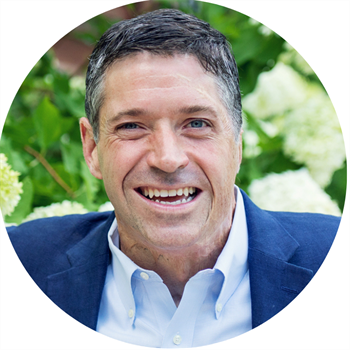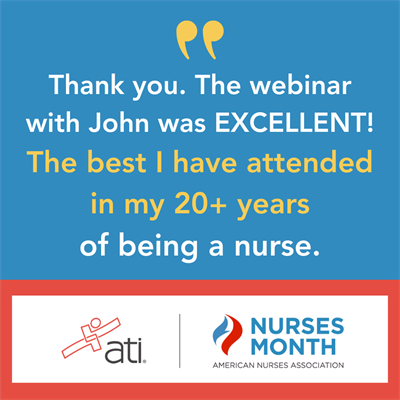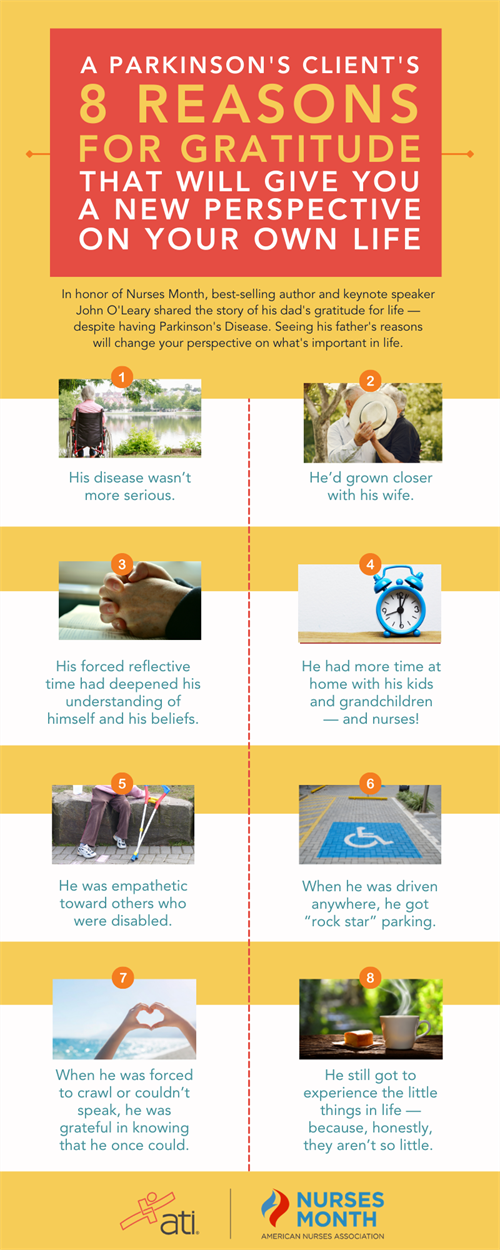BEST-SELLING AUTHOR JOHN O'LEARY HELPS YOU LEARN TO BE HAPPY
THE POSITIVE IMPACT OF NEGATIVE EVENTS: HOW TO LIVE A JOYFUL LIFE
It’s been a hard, hard year. And that makes it so, so easy to focus on the negatives:
- The obstacles and frustrations of remote teaching
- Job losses and bereavements
- The diminishing passion for your job, a negative body image, relational issues, emotional crises, or financial challenges.
The result can leave you bitter, angry, and resentful.
Sometimes, though, you meet a person whose story helps put it all back into perspective. A person who is familiar with the difficulties of the nursing profession. A person who has deep affection and respect for nursing.
 A person named John O’Leary.
A person named John O’Leary.
LISTEN TO JOHN O’LEARY’S KEYNOTE PRESENTATION FOR NURSES MONTH (see details below)
A PERSPECTIVE OF GRATITUDE, JOY, & EXUBERANCE FOR LIFE
If anyone knows the challenges of a difficult life — one filled with both emotional and physical pain, who had every reason to give in to bitterness, anger, and resentment — it is John O’Leary.
At age 9, he was burned on 100% of his body. Yes, literally 100%.
87% of those burns were third-degree, and O’Leary spent more than 5 months in the hospital experiencing — in his words — the “torture” of treating those burns.
But O’Leary is the opposite of bitter, angry, and resentful.
He radiates gratitude, joy, and exuberance for a life of mission and vision.
“It’s very easy to have all of that beat out of us,” he explains. “It’s easy to give up on the positive aspects of life. It’s easy to focus on all you do not have,” he says.
But the power and benefits of gratitude, he points out, are so much stronger.
SEEING LIFE THROUGH A NEW LENS
Today, O’Leary uses his optimistic outlook to help others as an inspirational speaker. He attributes many people to having influenced his positive attitude. But he gives special thanks to the nurses who cared for him when he was just a boy.
As a result, when ATI contacted him to speak to nurse educators and nursing students during Nurses Month, he said he jumped at the chance. He wanted to use his experience to help those in nursing regain their passion, which has been put under such stress over the last year.In recent years, his appreciation for nurses has shifted from those who cared for him to those who now care for his father. He has slowly watched as Parkinson’s Disease has robbed his father of so much. Yet, he has also been awed by his father’s ongoing gratitude.

“He continually exhibits pure joy, gratitude, hope, zest, and life,” O’Leary said.
O’Leary understands that many may not "get" the grounds for such optimistic outlooks. Yet, he notes that research continuously reminds us of its power.
“In choosing gratitude, you’re more relaxed,” he said. “Gratitude reduces stress. You become more resilient. You’re happier — not only in the present tense but in the past tense, because as you look back, you’re less envious.”
Besides emotional benefits, gratitude has physical benefits. “It makes you more attractive,” he said with a grin. “To have a grateful heart makes you more attractive. It reduces your stress. It leads to longevity and effectiveness and creativity.” And, for those in nursing, gratitude even leads to higher, more successful patient impact.1
And, while all of this is very good, O’Leary leaned in once more on what he believes is the most important aspect of gratitude.
“For you, educators, it means this: In choosing gratitude, you get more joy. That includes contentment, and peace, and happiness regardless of the headwinds you face in the classroom or beyond.”
THE POSITIVE IMPACT OF PARKINSON’S DISEASE
Understanding O’Leary’s father’s response to Parkinson’s provides insight into why O’Leary feels so strongly that you can overcome any negative attitude.
That’s because, despite all the challenges of this slowly debilitating illness, O’Leary’s father continually exhibits pure joy, gratitude, hope, and zest for life. “What I notice on my dad’s face and every time I’m with him is pure joy,” O’Leary explained.
How has his father maintained his optimistic attitude?
O’Leary loves to explain. About 5 years ago, when his father could still talk, he said, the 2 were sitting on a front porch, enjoying the day, when his dad spilled a glass of iced tea into his lap. Most people’s impulse would be to immediately jump up — or at least utter a few explicit words. But Denny O’Leary couldn’t jump up. And, in fact, he didn’t say a word.
He just smiled.
O’Leary was familiar with his dad’s serene attitude. But this time, he asked: “Dad, why don’t you ever complain about how hard your life is?”
“John, how can I complain when my life is so good? When I’m just so blessed?” his dad replied.
Blessed? Blessed!? O’Leary asked his father to explain.
DENNIS O’LEARY’S 8 REASONS FOR GRATITUDE
 O’Leary described his conversation with his father during his keynote presentation during Nurses Month. It’s truly a joy to hear, so we encourage you to experience it yourself. (See instructions at the end of this article on how to access it). But we’ll summarize it here.
O’Leary described his conversation with his father during his keynote presentation during Nurses Month. It’s truly a joy to hear, so we encourage you to experience it yourself. (See instructions at the end of this article on how to access it). But we’ll summarize it here.
O’Leary’s father felt blessed — grateful — because:
- His disease wasn’t more serious.
- His forced reflective time had deepened his understanding of himself and his relationship with God.
- He’d grown closer with his wife.
- He had more time at home with his kids and grandchildren — and nurses!
- He’d become more empathetic toward others who were disabled.
- When he was forced to crawl or couldn’t speak, he was grateful in knowing that he once could.
- When he was driven anywhere, he got “rock star” parking.
- He still got to experience the little things in life — because, honestly, they aren’t so little.
Reason 1: His disease wasn’t more serious.
O’Leary’s father told him he was grateful he didn’t have a more serious disease. “It could have been far worse,” he explained.
Educators, nurses, and nursing students better understand that perspective compared to the general public, O’Leary added. You’ve seen how much worse off clients could be. “But, when you’re the one going through that struggle, to own it in your own life? That’s incredible insight,” he said with admiration.
Reason 2: His forced reflective time had deepened his understanding of himself and his relationship with God.
“John, I used to be so busy,” O’Leary’s dad told him. “But now I’ve got nothing but time to reflect on who I am, what really matters, and where God is in my story. And I’m really grateful for this time.”
DOWNLOAD THE INFOGRAPHIC AT RIGHT AS A HANDY REFERENCE
Reason 3: He’d grown closer with his wife.
O’Leary didn’t immediately get it when his dad told him he’d “always liked your mom.” Uh, sure, dad. Of course. You’ve been married to her for 52 years.
“I think you’re missing the point,” his dad explained when O’Leary stated the obvious. Since his diagnosis, Denny O’Leary said, “My coworkers no longer saw value in the work I did, so they showed me the exit. My friends no longer come around to pick me up for a cup of coffee or a round of golf. Everybody has pushed me toward the outskirts of life. Everybody, except for your mother. My wife. This lady, she just keeps coming closer and closer and closer.”
Reason 4: He had more time at home with his kids and grandchildren — and nurses!
Denny O’Leary now has 6 kids and 21 grandkids. He said he was incredibly grateful for the time he’d gotten to spend with them — time he would otherwise likely have been working.
Then, without hesitating, he added, “I’m grateful for medical technology and the ladies and gentlemen and human beings who provide it.”
Translating a bit for his father, O’Leary said, “Let’s just condense that down to one word: Nurses!”
He said his father recognized he couldn’t have the life he lived without the help nurses provided — “without these incredible human beings coming into his life, guiding him forward toward possibility,” John said. “He’s grateful to them.”
Reason 5: He’d become more empathetic toward others who were disabled.
O’Leary’s father next made a confession. “John,” he said, “when I was on top of the world, I’m not sure I saw the struggles of those who felt buried by it. But now I’ve joined them, and I get it. My eyes have been opened. My heart has been opened, and I’ve grown in compassion.”
John paused at this point, speaking directly to his audience of educators and students. “What a gift it can be, nurses, to go through a struggle, because it can open up our ability to heal those around us even to a higher level.”
Reason 6: When he was forced to crawl or couldn’t speak, he was grateful in knowing that he once could.
Today, O’Leary’s father’s disease has progressed to where both conditions have come true; he can no longer walk or speak. But at the time he chatted with his son, he was describing his recognition of such a day. And he anticipated that when that day arrived, he would think back and remember, “It wasn’t always like this.”
Reason 7: When he was driven anywhere, he got “rock star” parking.
Continuing to describe the conversation with his father, O’Leary divulges that this next reason of his dad’s might be his favorite. His father confided, “John, when your mother drives me somewhere, I’m grateful for the handicapped spot.” He went on, “It is as if a red carpet has been rolled right out to my vehicle! We are rock star VIP parkers everywhere we go!”
Reason 8: He still got to experience the little things in life — because, honestly, they aren’t so little.
 O’Leary said he recognized some people might think Reason 7 — getting to park in the disabled spot — might seem trivial or even stupid. But he pointed out that little things in life like that are not little.
O’Leary said he recognized some people might think Reason 7 — getting to park in the disabled spot — might seem trivial or even stupid. But he pointed out that little things in life like that are not little.
Don’t take them for granted, he emphasized, whether it’s a hot cup of coffee, the ability to read this article, or — talking directly to his educator listeners, again — “doing mission work every day of your life and somehow to be paid for it — what a gift!”
TAKING AN INVENTORY OF THE LITTLE THINGS
“My dad takes inventory,” O’Leary explained. “That’s why he is grateful to see, hear, learn, laugh, and love every day and live."
His dad acknowledged his reality — that either Parkinson’s Disease or some other calamity or illness would eventually claim his life. “But every single day, I wake up grateful. I slide into my wheel chair. I roll to the kitchen window, I look east, and I wait for it — for the light to cut through the darkness.
“And I recognize [life] is not easy; it’s not perfect. It won’t be on this side of eternity. But it is good. And even better days are in store for us.”
LISTEN TO JOHN O’LEARY’S KEYNOTE PRESENTATION FOR NURSES MONTH
ATI is proud to have sponsored John O’Leary as a gift to educators everywhere during Nurses Month. We invite you to view an encore presentation of his inspiring message — recorded Wednesday, May 19, 2021 — in ATI Academy through July 31, 2021. Simply search the Content Library for “ATI Talk.”
1RESOURCES
- Ann Fournier, Caryn Sheehan, Growing gratitude in undergraduate nursing students: Applying findings from social and psychological domains to nursing education, Nurse Education Today, Volume 35, Issue 12, 2015, Pages 1139-1141, ISSN 0260-6917. https://doi.org/10.1016/j.nedt.2015.08.010.
- Adam P. McGuire, Brienna M. Fogle, Jack Tsai, Steven M. Southwick, Robert H. Pietrzak, Dispositional gratitude and mental health in the U.S. veteran population: Results from the National Health and Resilience Veterans Study, Journal of Psychiatric Research, Volume 135, 2021, Pages 279-288, ISSN 0022-3956. https://doi.org/10.1016/j.jpsychires.2021.01.020.
- Anna L. Boggiss, Nathan S. Consedine, Jennifer M. Brenton-Peters, Paul L. Hofman, Anna S. Serlachius, A systematic review of gratitude interventions: Effects on physical health and health behaviors, Journal of Psychosomatic Research, Volume 135, 2020, 110165, ISSN 0022-3999. https://doi.org/10.1016/j.jpsychores.2020.110165.
- Stephen Gallagher, Ann-Marie Creaven, Siobhán Howard, Annie T. Ginty, Anna C. Whittaker, Gratitude, social support and cardiovascular reactivity to acute psychological stress, Biological Psychology, Volume 162, 2021, 108090, ISSN 0301-0511. https://doi.org/10.1016/j.biopsycho.2021.108090.
- Kevin A. Cook, Katharine M. Woessner, Andrew A. White, Happy asthma: Improved asthma control with a gratitude journal, The Journal of Allergy and Clinical Immunology: In Practice, Volume 6, Issue 6, 2018, Pages 2154-2156, ISSN 2213-2198. https://doi.org/10.1016/j.jaip.2018.04.021.
